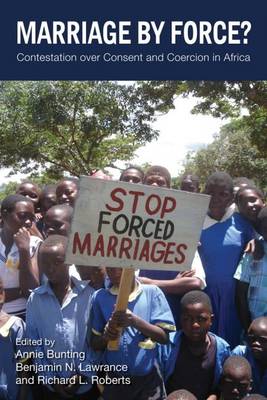
Stock image for illustration purposes only - book cover, edition or condition may vary.
Marriage by Force?: Contestation over Consent and Coercion in Africa
Annie Bunting
€ 108.04
FREE Delivery in Ireland
Description for Marriage by Force?: Contestation over Consent and Coercion in Africa
Hardback. Editor(s): Bunting, Annie; Lawrance, Benjamin N.; Roberts, Richard L. Num Pages: 320 pages, illustrations. BIC Classification: 1H; JHBK. Category: (G) General (US: Trade). Dimension: 161 x 237 x 26. Weight in Grams: 664.
With forced marriage, as with so many human rights issues, the sensationalized hides the mundane, and oversimplified popular discourses miss the range of experiences. In sub-Saharan Africa, the relationship between coercion and consent in marriage is a complex one that has changed over time and place, rendering impossible any single interpretation or explanation. The legal experts, anthropologists, historians, and development workers contributing to Marriage by Force? focus on the role that marriage plays in the mobilization of labor, the accumulation of wealth, and domination versus dependency. They also address the crucial slippage between marriages and other forms of gendered violence, bondage, slavery, and servile status. Only by examining variations in practices from a multitude of perspectives can we properly contextualize the problem and its consequences. And while early and forced marriages have been on the human rights agenda for decades, there is today an unprecedented level of international attention to the issue, thus making the coherent, multifaceted approach of Marriage by Force? even more necessary.
Product Details
Publisher
Ohio University Press
Format
Hardback
Publication date
2016
Condition
New
Weight
663g
Number of Pages
358
Place of Publication
Athens, United States
ISBN
9780821421994
SKU
V9780821421994
Shipping Time
Usually ships in 7 to 11 working days
Ref
99-1
About Annie Bunting
Annie Bunting is an associate professor in the Law and Society program at York University in Toronto. Her forthcoming book is The Invention of Contemporary Slavery, edited with Joel Quirk. Benjamin N. Lawrance is a professor of African history at the University of Arizona and author of Amistad's Orphans: An Atlantic Story of Children, Slavery, and Smuggling. Richard L. Roberts directs the Center for African Studies at Stanford University. His books include Trafficking in Slavery's Wake: The Experience of Women and Children in Africa, edited with Benjamin N. Lawrance. Emily S. Burrill is an associate professor in the Department of Women's and Gender Studies at the University of North Carolina at Chapel Hill and coeditor of Domestic Violence and the Law in Colonial and Postcolonial Africa.
Reviews for Marriage by Force?: Contestation over Consent and Coercion in Africa
This fascinating collection addresses the important problem of determining what forced marriage is through the perspective of historical studies of marriage from precolonial through postcolonial eras in Africa. The essays destabilize any idea that there is a simple dichotomy between forced and consensual marriage, and show that calling forms of coerced marriage customary or traditional ignores the extent to which tradition is constantly subject to change. -Sally Engle Merry, Silver Professor of Anthropology, New York University, and author of Gender Violence: A Cultural Perspective This eloquent volume tackles age-old yet pressing problems of coercion, gender, and marriage in present-day Africa. The authors offer compelling case studies to demonstrate the deep-seated and complex values that underpin the subordination of women and girls and highlight the vulnerability of the female gender in the face of a growing movement-in Africa and abroad-to address the problem. This volume is a must-read for all those who teach, think, write, and formulate laws and public policy about gender and violence. - Makau Mutua, World Bank and SUNY Buffalo Law School Marriage by Force? pulls back the curtain and reveals the layers of social structures, gender, resistance, and liberation which manifest themselves when marriage is forced. The volume asks pertinent questions about a continuum of coercion in war and peace. Ultimately, the contributors have provided new perspectives on marriage, where contestations exist, with regard to not only the patriarchies of control of sexuality, the body and behavior, but also over labor, belonging and longing. - Jean Allain, Queen's University Belfast and the University of Pretoria
